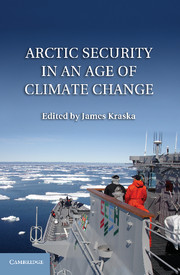Book contents
- Frontmatter
- Contents
- Figures and Tables
- Contributor Biographies
- Foreword
- Part I Introduction: Circumpolar Perspectives
- Part II European Security Interests in the Arctic
- 4 Arctic Security and Norway
- 5 Norway and the Arctic
- 6 Military Aspects of Russia's Arctic Policy
- 7 The Russian Arctic in the Twenty-First Century
- 8 The Rise of the Arctic on the Global Stage
- 9 The Arctic Challenge to Danish Foreign and Security Policy
- 10 Arctic Security
- 11 Territorial Discourses and Identity Politics
- Part III North American Security Interests in the Arctic
- Afterword
- Index
- References
4 - Arctic Security and Norway
Published online by Cambridge University Press: 07 September 2011
- Frontmatter
- Contents
- Figures and Tables
- Contributor Biographies
- Foreword
- Part I Introduction: Circumpolar Perspectives
- Part II European Security Interests in the Arctic
- 4 Arctic Security and Norway
- 5 Norway and the Arctic
- 6 Military Aspects of Russia's Arctic Policy
- 7 The Russian Arctic in the Twenty-First Century
- 8 The Rise of the Arctic on the Global Stage
- 9 The Arctic Challenge to Danish Foreign and Security Policy
- 10 Arctic Security
- 11 Territorial Discourses and Identity Politics
- Part III North American Security Interests in the Arctic
- Afterword
- Index
- References
Summary
Introduction
Global warming is one of the most serious threats facing mankind. Many regions and countries will be affected, and there will be many losers. The earliest and most intense climatic changes are being experienced in the Arctic region. Arctic average temperature has risen at twice the rate of the global average in the past half century. These changes provide an early indication for the world of the environmental and societal significance of global warming. For that reason, the Arctic presents itself as an important scientific laboratory for improving our understanding of the causes and patterns of climate changes.
The rapidly rising temperature threatens the Arctic ecosystem, but the human consequences seem to be far less dramatic there than in many other places in the world. According to the U.S. National Intelligence Council, Russia has the potential to gain the most from increasingly temperate weather, because its petroleum reserves become more accessible and because the opening of an Arctic waterway could provide economic and commercial advantages. Norway might also be fortunate. Some years ago, the Financial Times asked: “What should Norway do about the fact that global warming will make their climate more hospitable and enhance their financial situation, even as it inflicts damage on other parts of the world?”
- Type
- Chapter
- Information
- Arctic Security in an Age of Climate Change , pp. 47 - 63Publisher: Cambridge University PressPrint publication year: 2011
References
- 6
- Cited by



